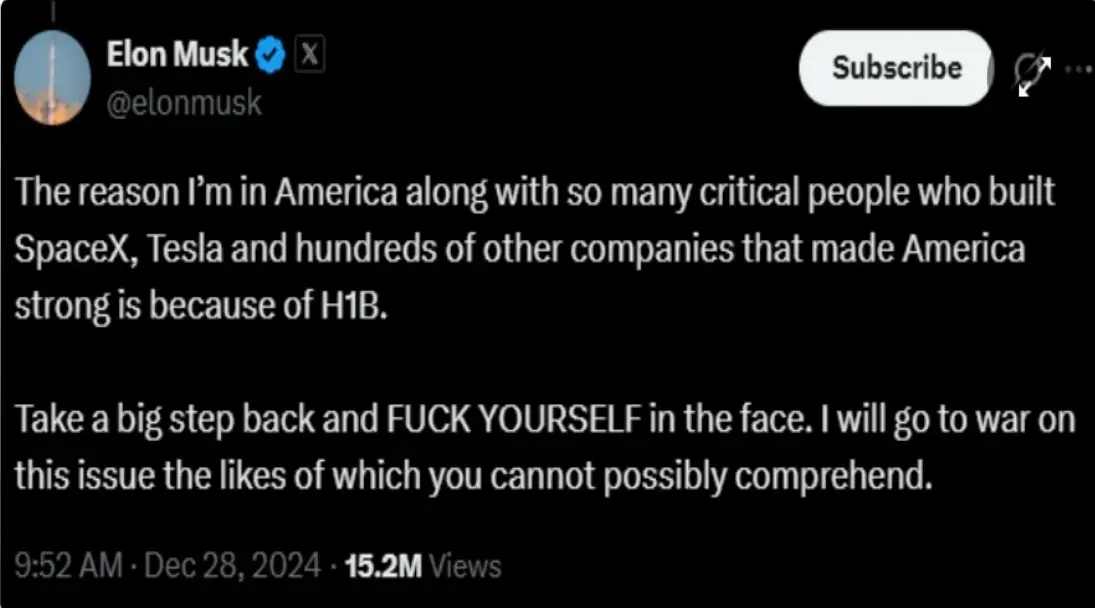New Delhi (India): Tesla CEO Elon Musk’s past remarks on the H-1B visa programme resurfaced on Sunday, just hours after U.S. President Donald Trump announced a dramatic hike in application fees. The new annual cost of $100,000 per H-1B petition — a staggering increase from the earlier fee — has sent shockwaves across the tech industry and among foreign workers in the United States.
Trump’s move sparks fresh debate
On Saturday, President Trump signed a proclamation introducing the fee hike, stating the measure would encourage companies to prioritise American workers while still allowing firms to recruit “truly extraordinary people” from abroad. The move, which comes into effect immediately, is being described as one of the most consequential changes to U.S. immigration policy in decades.
The announcement has triggered widespread concern, particularly among Indian IT professionals, who account for the largest share of H-1B visa holders. Families, companies, and immigration experts have been scrambling to understand the implications of the new policy.
Musk’s shifting stance on H-1B
Elon Musk, who himself emigrated from South Africa to the United States, has long acknowledged the importance of the H-1B system. He credited the visa programme for enabling him and many “critical people” to work in America and build companies such as SpaceX and Tesla.
“The reason I’m in America, along with so many critical people who built SpaceX, Tesla and hundreds of other companies that made America strong, is because of H1B,” Musk had written in a widely shared post.
However, Musk’s views on the programme have not always been consistent. In a series of tweets that went viral after Trump’s announcement, Musk described the H-1B programme as “broken” and in need of “major reform.”
“There is no question that the H1B system needs to be overhauled,” Musk had stated, calling for significant changes to how it operates.
Support and criticism in equal measure
Musk has previously pledged to “go to war” to defend the H-1B system, arguing that foreign talent has been crucial to U.S. innovation. He has also advocated for a significant increase in legal migration overall, highlighting the contributions of international workers in the American economy.
Yet, at other times, Musk has suggested tightening the programme by “raising the minimum salary significantly” and “adding a yearly cost for maintaining the H1B, making it materially more expensive to hire from overseas than domestically.”
These seemingly contradictory remarks have sparked renewed debate online, with critics accusing Musk of flip-flopping on the issue. Supporters, however, argue that his nuanced stance reflects the need to balance opportunities for foreign talent with protections for domestic workers.

Wider implications for India
The policy shift has caused anxiety across India, where thousands of professionals aspire to work in the U.S. under the H-1B system. Industry experts warn that the steep cost could discourage smaller companies from sponsoring foreign employees, concentrating opportunities only among the wealthiest firms.
Indian IT giants such as Infosys, TCS, and Wipro are expected to bear the brunt of the new regime, while employees currently abroad face uncertainty about their future.
Conclusion
With the U.S. administration stressing the importance of “hiring American,” Trump’s announcement is set to redefine the landscape of skilled migration. Meanwhile, Elon Musk’s resurfaced comments — swinging between defence and critique of the programme — have only deepened the ongoing debate on the role of foreign workers in powering America’s innovation economy.
